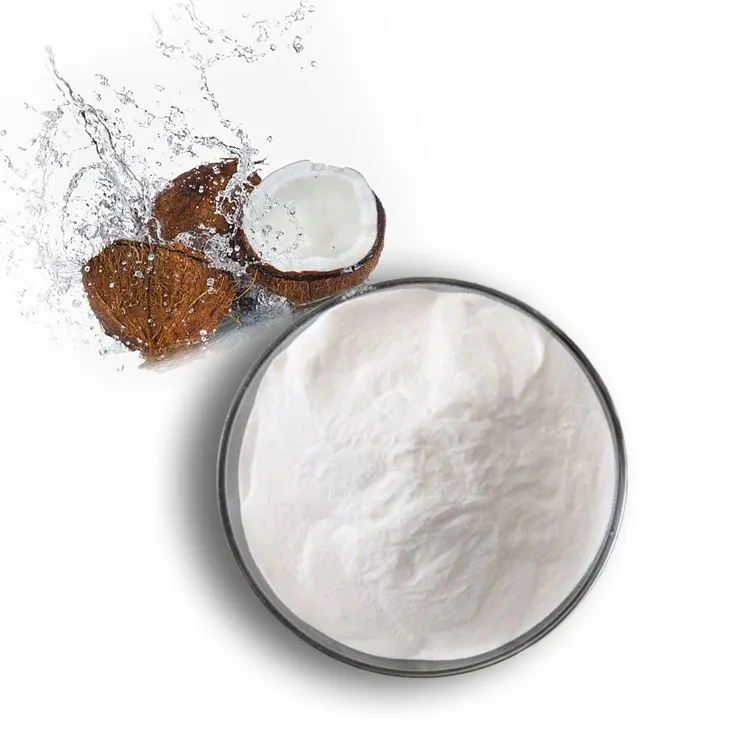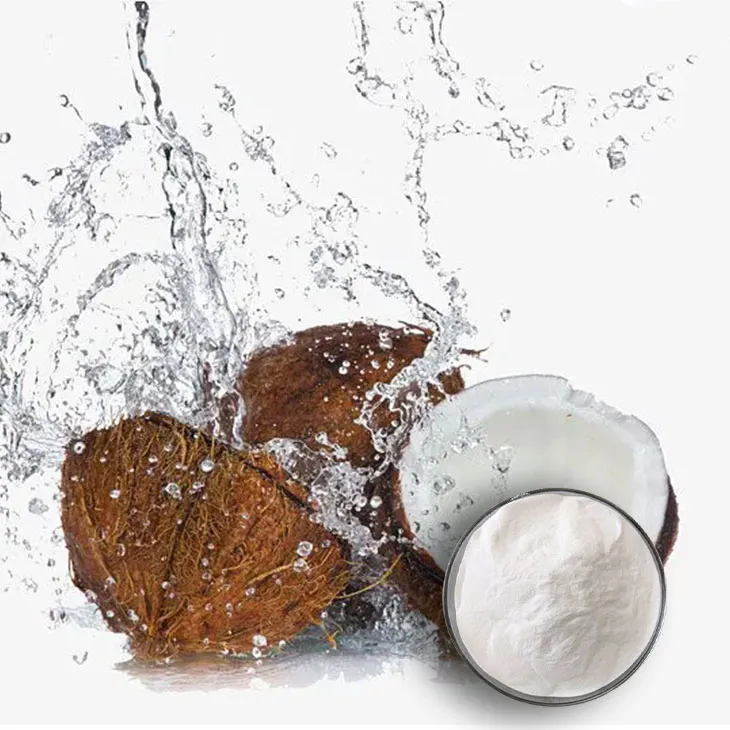- 0086-571-85302990
- sales@greenskybio.com
Is coconut water powder beneficial for diabetes? Are these all safe and suitable for diabetic patients?
2024-11-14

1. Introduction
Diabetes is a chronic metabolic disorder that affects millions of people worldwide. Management of diabetes involves a combination of lifestyle modifications, including diet, exercise, and in some cases, medication. In recent years, there has been growing interest in natural products that may potentially assist in diabetes management. Coconut Water Powder, derived from the liquid inside young coconuts, has emerged as a product with potential health benefits. However, its implications for diabetes are not yet fully understood. This article aims to explore the relationship between Coconut Water Powder and diabetes, including its nutritional value, potential benefits in controlling diabetes symptoms, and its safety for diabetic individuals, taking into account different manufacturing processes and potential interactions with diabetes medications.

2. Nutritional Profile of Coconut Water Powder
Coconut water powder contains a variety of nutrients that may be relevant to diabetes management.
2.1. Electrolytes
Coconut water is rich in electrolytes such as potassium, sodium, and magnesium. Potassium is particularly important as it helps in maintaining proper nerve and muscle function. In diabetic patients, electrolyte balance can be disrupted due to factors such as increased urination. Adequate potassium intake may help in preventing complications related to electrolyte imbalance. However, diabetic patients with kidney problems need to be cautious as excessive potassium intake can be harmful.
2.2. Vitamins
Coconut water powder may also contain vitamins such as vitamin C. Vitamin C is an antioxidant that can help in reducing oxidative stress in the body. Oxidative stress is often increased in diabetic patients, and antioxidants may play a role in preventing or delaying the development of diabetes - related complications.
2.3. Carbohydrates
One of the concerns for diabetic patients regarding coconut water powder is its carbohydrate content. While coconut water in its natural form contains some sugars, the powder form may have a concentrated amount of carbohydrates. However, the type of carbohydrates present also matters. Some of the carbohydrates in coconut water may be in the form of dietary fiber, which can have a positive impact on blood sugar control. Dietary fiber slows down the absorption of glucose in the intestine, thereby preventing rapid spikes in blood sugar levels.

3. Potential Benefits for Diabetes Symptoms
There are several ways in which coconut water powder might potentially benefit diabetes symptoms.
3.1. Blood Sugar Control
As mentioned earlier, the dietary fiber in coconut water powder can contribute to better blood sugar control. Additionally, some studies suggest that certain compounds in coconut water may have a hypoglycemic effect. However, more research is needed to confirm these findings and to determine the appropriate dosage for diabetic patients. It is important to note that coconut water powder should not be considered a substitute for diabetes medications but rather as a complementary addition to a diabetes - friendly diet.
3.2. Hydration
Good hydration is essential for diabetic patients. Coconut water powder, when reconstituted, can provide a source of hydration. Adequate hydration helps in maintaining proper kidney function, which is crucial for diabetic patients as they are at a higher risk of developing kidney problems. Moreover, proper hydration can also improve circulation and overall well - being.
3.3. Antioxidant Activity
The antioxidant vitamins and other compounds in coconut water powder may help in reducing oxidative stress in diabetic patients. High levels of oxidative stress are associated with the development of various diabetes - related complications such as neuropathy, retinopathy, and cardiovascular disease. By reducing oxidative stress, coconut water powder may potentially play a role in preventing or delaying the onset of these complications.

4. Safety Considerations for Diabetic Patients
When considering the use of coconut water powder by diabetic patients, several safety aspects need to be taken into account.
4.1. Manufacturing Processes
Different manufacturing processes can affect the quality and safety of coconut water powder. Some processes may involve the addition of additives or preservatives that could potentially be harmful to diabetic patients. For example, some additives may contain high amounts of sugars or artificial sweeteners that can disrupt blood sugar control. It is important to choose coconut water powder products that are minimally processed and free from unnecessary additives.
4.2. Interaction with Medications
Diabetic patients often take medications to control their blood sugar levels. There is a possibility of interactions between coconut water powder and diabetes medications. For instance, if coconut water powder has a hypoglycemic effect, combining it with certain diabetes medications may lead to dangerously low blood sugar levels (hypoglycemia). Therefore, it is crucial for diabetic patients to consult their healthcare providers before starting to use coconut water powder, especially if they are on multiple medications.
4.3. Allergies and Sensitivities
Some individuals may be allergic to coconuts or may have sensitivities to certain components in coconut water powder. Allergic reactions can range from mild skin rashes to severe anaphylactic shock. Diabetic patients with known coconut allergies should obviously avoid coconut water powder. Additionally, those with sensitivities may experience digestive problems or other adverse reactions, which can further complicate diabetes management.
5. Conclusion
Coconut water powder has a nutritional profile that contains elements potentially beneficial for diabetes management, such as electrolytes, vitamins, and dietary fiber. It may offer benefits in terms of blood sugar control, hydration, and antioxidant activity. However, safety considerations are crucial. The manufacturing process should be carefully examined to avoid additives that could be harmful to diabetic patients, and potential interactions with diabetes medications need to be considered. Diabetic patients should also be aware of allergies and sensitivities. Overall, while coconut water powder shows promise, more research is needed to fully understand its role in diabetes management. Diabetic patients should always consult their healthcare providers before incorporating coconut water powder into their diet.
FAQ:
1. What is the nutritional composition of coconut water powder?
Coconut water powder typically contains various nutrients. It has electrolytes like potassium, which is important for maintaining proper fluid balance and nerve function. It may also have some vitamins such as vitamin C in small amounts, as well as certain minerals. However, the exact composition can vary depending on the manufacturing process and the source of the coconut water used to make the powder.
2. How could coconut water powder potentially help with diabetes symptoms?
Some believe that the natural electrolytes in coconut water powder, especially potassium, may help with overall health and potentially play a role in maintaining proper blood pressure, which is often an issue in diabetic patients. Also, its hydrating properties might be beneficial as diabetics need to stay well - hydrated. However, there is no conclusive evidence that it directly aids in controlling blood sugar levels, which is a key aspect of diabetes management.
3. Is coconut water powder safe for all diabetic patients?
Not necessarily. While coconut water powder is generally considered safe for most people in moderation, diabetic patients need to be cautious. Some coconut water powders may have added sugars or sweeteners during the manufacturing process, which can be harmful to diabetics. Also, individual sensitivities and reactions can vary. For example, some diabetics may have an adverse reaction to certain components in the powder, so it's important to consult a doctor before consuming it regularly.
4. Can coconut water powder interact with diabetes medications?
There is currently no widespread evidence of direct interactions between coconut water powder and common diabetes medications. However, because the body's metabolism and response to substances can be complex in diabetic patients, it's still advisable to consult a healthcare provider. If there are any potential interactions, they could affect the effectiveness of the medications or cause unexpected side effects.
5. How should diabetic patients incorporate coconut water powder into their diet?
If a diabetic patient decides to try coconut water powder, they should start with small amounts and monitor their blood sugar levels closely. It should be used as a part of a balanced diet, not as a replacement for proper diabetes management. Look for pure coconut water powder without added sugars or artificial sweeteners. Also, it's important to consider the overall calorie intake from the powder as excessive calorie consumption can affect blood sugar control.
Related literature
- The Role of Natural Substances in Diabetes Management"
- "Nutritional Supplements and Diabetes: A Comprehensive Review"
- "Coconut Water and Its Impact on Health: A Scientific Perspective"
- ▶ Hesperidin
- ▶ Citrus Bioflavonoids
- ▶ Plant Extract
- ▶ lycopene
- ▶ Diosmin
- ▶ Grape seed extract
- ▶ Sea buckthorn Juice Powder
- ▶ Fruit Juice Powder
- ▶ Hops Extract
- ▶ Artichoke Extract
- ▶ Mushroom extract
- ▶ Astaxanthin
- ▶ Green Tea Extract
- ▶ Curcumin
- ▶ Horse Chestnut Extract
- ▶ Other Product
- ▶ Boswellia Serrata Extract
- ▶ Resveratrol
- ▶ Marigold Extract
- ▶ Grape Leaf Extract
- ▶ New Product
- ▶ Aminolevulinic acid
- ▶ Cranberry Extract
- ▶ Red Yeast Rice
- ▶ Red Wine Extract
-
Hericium erinaceus extract powder
2024-11-14
-
Propolis Extract Powder
2024-11-14
-
Beetroot Powder
2024-11-14
-
Quercetin
2024-11-14
-
Motherwort Extract
2024-11-14
-
Sugarcane Extract
2024-11-14
-
Yellow Pine Extract
2024-11-14
-
Kupilu Extract
2024-11-14
-
Chaste Berry Extract
2024-11-14
-
Cassia Seed Extract
2024-11-14





















